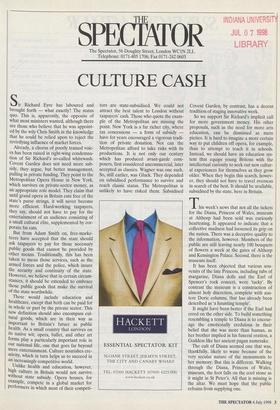SPE nu TO
INDIANA UNIVERSIn JUL 0 7 1998
LIBRARY
The Spectator, 56 Doughty Street, London WC1N 2LL Telephone: 0171-405 1706; Fax 0171-242 0603
CULTURE CASH
Sir Richard Eyre has laboured and brought forth — what exactly? The status quo. This is, apparently, the opposite of what most ministers wanted, although there are those who believe that he was appoint- ed by the wily Chris Smith in the knowledge that he could be relied upon to reject the revivifying influence of market forces.
Already, a chorus of poorly trained voic- es has been raised in right-wing condemna- tion of Sir Richard's so-called whitewash. Covent Garden does not need more sub- sidy, they argue, but better management, pulling in private funding. They point to the Metropolitan Opera House in New York, which survives on private-sector money, as an appropriate role model. They claim that until grand opera in Britain cuts free of the state's purse strings, it will never become more efficient. Hard-working taxpayers, they say, should not have to pay for the entertainment of an audience consisting of a small cultural elite, supplemented by cor- porate fat cats.
But from Adam Smith on, free-marke- teers have accepted that the state should ask taxpayers to pay for those necessary public goods that cannot be provided by other means. Traditionally, this has been taken to mean those services, such as the armed forces and the police, which insure the security and continuity of the state. However, we believe that in certain circum- stances, it should be extended to embrace those public goods that make the survival of the state worthwhile.
These would include education and healthcare, except that both can be paid for in whole or part by the private sector. This new definition should also encompass cul- tural goods, which are in their way as important to Britain's future as public health. As a small country that survives on its native wit; opera, ballet, and other art forms play a particularly important role in our national life, one that goes far beyond mere entertainment. Culture nourishes cre- ativity, which in turn helps us to succeed in an increasingly competitive world. . Unlike health and education, however, high culture in Britain would not survive without state subsidy. Opera houses, for example, compete in a global market for performers in which most of their competi- tors are state-subsidised. We could not attract the best talent to London without taxpayers' cash. Those who quote the exam- ple of the Metropolitan are missing the point. New York is a far richer city, where tax concessions — a form of subsidy have for years encouraged a vigorous tradi- tion of private donation. Nor can the Metropolitan afford to take risks with its productions. It is not only our century which has produced avant-garde com- posers, first considered uncommercial, later accepted as classics. Wagner was one such. So, still earlier, was Gluck. They depended on subsidised performance to survive and reach classic status. The Metropolitan is unlikely to have risked them. Subsidised Covent Garden, by contrast, has a decent tradition of staging innovative work.
So we support Sir Richard's implicit call for more government money. His other proposals, such as the need for more arts education, can be dismissed as mere pieties. It is hard to imagine a more certain way to put children off opera, for example, than to attempt to teach it in schools. Instead, we should have an education sys- tem that equips young Britons with the intellectual curiosity to seek out new cultur- al experiences for themselves as they grow older. When they begin this search, howev- er, they should not have to travel overseas in search of the best. It should be available, subsidised by the state, here in Britain.
This week's news that not all the tickets for the Diana, Princess of Wales, museum at Althorp had been sold was curiously heartening. It appeared to indicate that a collective madness had loosened its grip on the nation. There was a deceptive quality to the information, however. Members of the public are still leaving nearly 100 bouquets of flowers a week at the gates of Althorp and Kensington Palace. Second, there is the museum itself.
It has been objected that various sou- venirs of the late Princess, including tubs of margarine, Diana dolls and the Earl of Spencer's rock concert, were 'tacky'. By contrast the museum is a construction of almost holy discretion, complete with aus- tere Doric columns, that has already been described as 'a haunting temple'.
It might have been better if the Earl had erred on the other side. To build something resembling a temple to Diana is to encour- age the emotionally credulous in their belief that she was more than human, as her brother implied in his funeral oration, a Goddess like her ancient pagan namesake.
The cult of Diana seemed one that was, thankfully, likely to wane because of the very secular nature of the monuments to her memory. But this is different. Walking through the Diana, Princess of Wales, museum, the foot falls on the cool stone as it might in St Peter's. All that is missing is the altar. We must hope that the public refrains from supplying one.














































































































 Previous page
Previous page